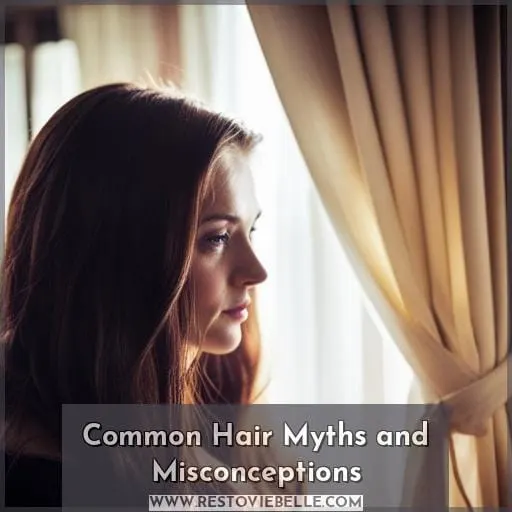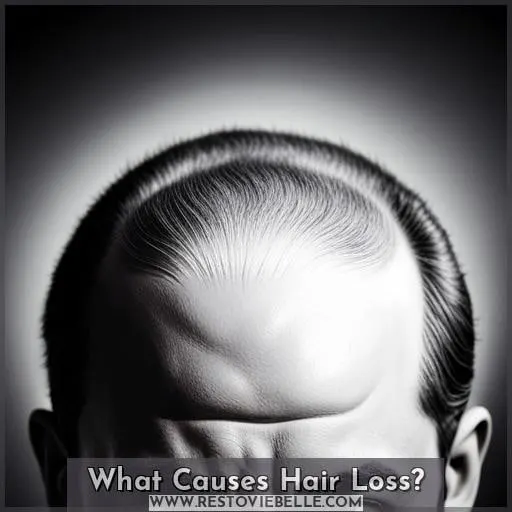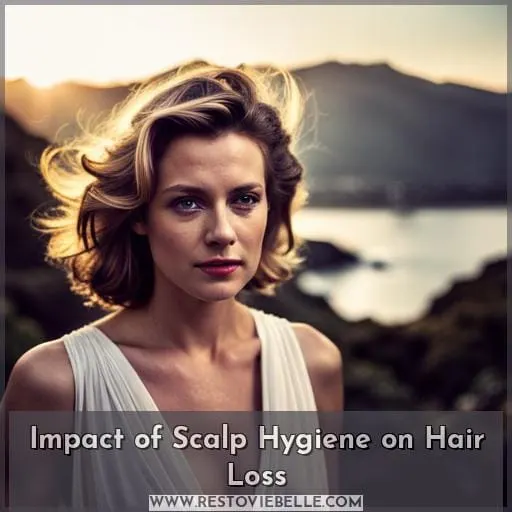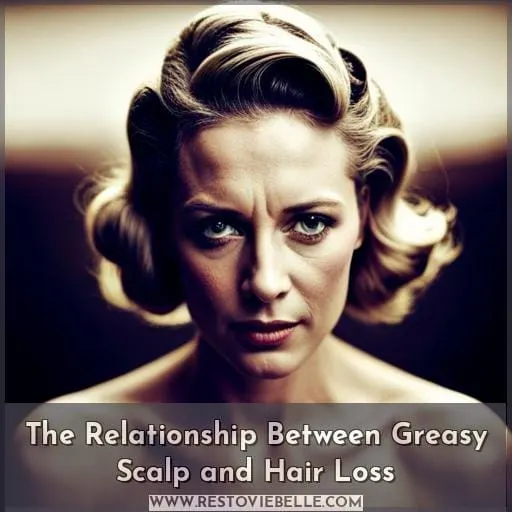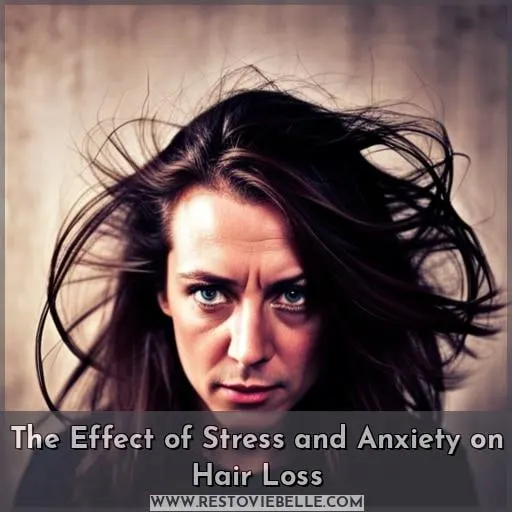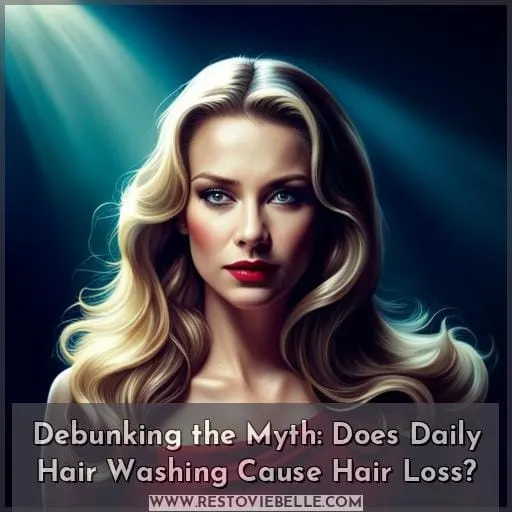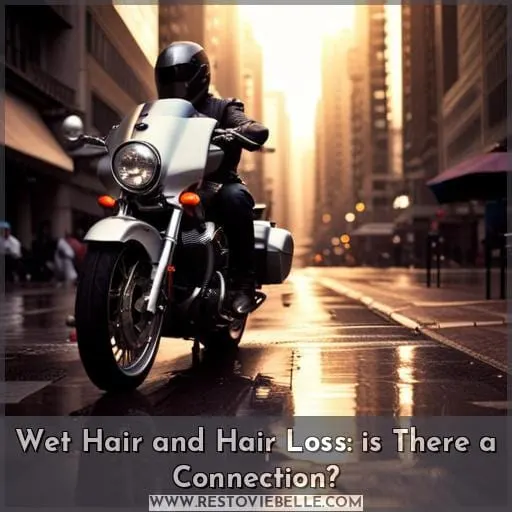This site is supported by our readers. We may earn a commission, at no cost to you, if you purchase through links.
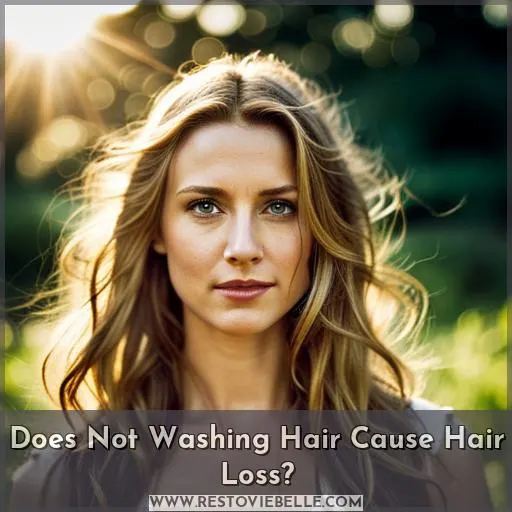
In this article, we explore the relationship between skipping shampooing sessions and hair loss, as well as other factors like stress levels or lifestyle choices that could be linked to alopecia.
Table Of Contents
- Key Takeaways
- Common Hair Myths and Misconceptions
- What Causes Hair Loss?
- Impact of Scalp Hygiene on Hair Loss
- How Often Should You Wash Your Hair to Prevent Hair Loss?
- The Relationship Between Greasy Scalp and Hair Loss
- The Effect of Stress and Anxiety on Hair Loss
- Debunking the Myth: Does Daily Hair Washing Cause Hair Loss?
- Wet Hair and Hair Loss: is There a Connection?
- The Link Between Drinking, Smoking, and Hair Loss
- Can Wearing Hats or Using Hair Products Lead to Baldness?
- Conclusion
Key Takeaways
- Skipping shampooing can impact hair loss.
- Infrequent washing can lead to oil and dirt buildup, weakening follicles.
- Not washing enough can lead to dandruff and infections.
- Wet hair and hair loss can be connected due to infrequent washing.
Common Hair Myths and Misconceptions
Misconceptions about hair washing and loss can lead you astray, so don’t be fooled by myths! Washing your hair daily won’t cause excessive shedding, but not cleaning enough could. Infrequent washes may result in oil and dirt buildup that weakens follicles or causes scalp disorders like dandruff or seborrheic dermatitis.
Hair texture, length, and activity level will all affect how often you should shampoo. Generally, it is recommended to shampoo 2-3 times per week for most people. Exercise doesn’t require a special ‘post-workout’ wash to prevent baldness.
Limited research suggests that regular washing helps maintain healthy hair growth.
Alternatives like the no-poo movement haven’t been proven any more effective than traditional shampoos either! Additionally, greasy scalps are prone to more shedding due to clogged pores from too much sebum production.
Dry shampoo can help on non-wash days if used properly with quality ingredients such as lavender root extract for antifungal properties and biotin, which strengthens strands against breakage.
If you are concerned about a sudden increase in loss during showers, consult a professional at The Wimpole Clinic who specializes in diagnosing contributing factors of this condition before it worsens further down the line.
What Causes Hair Loss?
It’s understandable to be concerned about hair loss, but the truth is that there are many factors that can contribute to it. Genetics and underlying health issues, vitamin deficiencies, stress levels, and scalp health caused by sebum oil buildup from not washing regularly are all potential causes.
Not washing your hair often enough can lead to scalp conditions such as dandruff or even infection, which may result in further hair loss. Washing more frequently helps remove dirt and product buildup, preventing clogged pores that weaken the roots of the hairs.
Even exercising doesn’t necessarily require daily washes as long as you avoid excessive sweat buildup on your scalp. However, if you have an active lifestyle, then more frequent shampooing might be necessary for optimal results.
If you’re unsure what could potentially cause your hair loss, seeking professional help with diagnosis is recommended before making any drastic changes in terms of wash frequency or diet modifications.
Impact of Scalp Hygiene on Hair Loss
When it comes to hair loss, the impact of scalp hygiene shouldn’t be overlooked. Clogged pores can weaken hair follicles, which in turn causes hair thinning and shedding; this is especially true if you’re prone to folliculitis or seborrheic dermatitis.
Similarly, dandruff that results from infrequent washing can cause further irritation on your scalp, leading to more extensive damage.
Clogged Pores and Hair Follicles
Clogged pores from a buildup of oil and dirt can weaken the structure of your hair follicles, leading to brittle strands and potential hair loss. Hair care maintenance is key for protecting follicle health. If not washed regularly, excessive grease will cause clogging, which can restrict growth.
Using a medicated shampoo as directed by your doctor may help in addressing scalp issues due to dirt build-up. Additionally, using dry shampoo between washes helps absorb excess oils while still nourishing the scalp without blocking any pores or weakening strand strength.
To prevent unwanted damage from occurring on your tresses, it’s important to practice proper hygiene habits. This includes washing two to three times per week with products suited for individual needs.
Folliculitis and Hair Loss
Folliculitis is a scalp disorder that can occur due to dirt and debris buildup, causing hair loss. For instance, Sarah experienced thinning after not washing her hair for three weeks. Symptoms of folliculitis may include redness, itchiness, swelling around the affected area, and, in severe cases, pus-filled pimples or bumps on the scalp.
Treatment involves using medicated shampoo prescribed by a doctor. Alternative ways to wash your hair, such as dry shampoo, can also be helpful as it absorbs excess oil without water. Additionally, regularly brushing with natural bristles and cutting back on product use will help keep your scalp clean while avoiding potential infections or irritation from harsh chemical ingredients found in commercial shampoos.
Prevention involves using gentle cleansers specially formulated for sensitive scalps. It is also important to follow proper hygiene practices, such as washing your hands frequently throughout the day to reduce bacteria transfer onto your head when touching it during activities like styling or scratching an itch on occasion.
Taking these steps can go a long way towards keeping you safe from folliculitis-related damage caused by insufficient cleaning. If left untreated over time, folliculitis can potentially lead to permanent balding patches.
Dandruff and Seborrheic Dermatitis
Unclean scalp can lead to itchy, red dandruff and seborrheic dermatitis – a nasty surprise you don’t want. Regular washing is key to preventing these conditions; medicated shampoo may be necessary in severe cases.
Keep your hair clean with weekly washes or use a non-comedogenic dry shampoo on days between washes for extra protection against oil buildup. Consult a dermatologist if symptoms persist even after proper care, as this could indicate an underlying health issue that needs attention from experts.
How Often Should You Wash Your Hair to Prevent Hair Loss?
To prevent hair loss, you should aim to wash your locks 2-3 times a week, depending on factors like texture, length, and activity levels. Keeping your scalp clean is key for healthy hair growth. Grease buildup can clog pores, leading to weakened follicles.
Here’s what else you need to know for optimal hair care:
- Exercise doesn’t require daily shampooing as long as sweat isn’t left on the scalp overnight.
- Alternatives such as the ‘no poo’ movement are unproven compared to regular shampoos.
- Use medicated shampoos only when prescribed by a doctor.
- Dry shampoo provides volume and oil absorption between washes.
- Keep an eye out for sudden increases in shedding during shower time – it could be indicative of an underlying issue!
With a proper understanding of how often one should wash their hair combined with good hygiene practices, you can maintain overall scalp health, which directly or indirectly contributes to healthy-looking tresses!
The Relationship Between Greasy Scalp and Hair Loss
Greasy buildup on the scalp can contribute to hair loss, leading to discomfort and weakened follicles. Excess sebum production from the oil glands may cause clogged pores, which lead to thinning hair. This oily film, also known as ‘scalp sebum’, traps dirt and impurities that accumulate over time, blocking healthy nutrients from reaching your scalp’s cells.
If left untreated for too long, these blockages can disrupt your hair growth cycle. They hinder natural processes like oxygenation of skin cells or resetting oil glands after a wash day. To keep excess oils at bay while ensuring optimal health of your follicles, experts recommend washing greasy locks with medicated shampoo every two to three days.
With regular use of such products designed specifically for those prone to oily scalps and excessive shedding, due to their increased absorption power, it will help reduce inflammation levels caused by deleted cell waste accumulation.
The Effect of Stress and Anxiety on Hair Loss
Stress and anxiety can significantly impact your hair health, with studies showing that high levels of stress can lead to up to 40% more hair loss. Hair shedding occurs when the body undergoes emotional or psychological distress; this is known as telogen effluvium.
It’s possible for both acute and chronic stressors, such as job insecurity, financial worries, and breakups, to contribute to accelerated hair thinning. To cope with these effects, it’s important to first understand the powerful connection between mental state and physical wellbeing in relation to our overall scalp health.
This is particularly important if you are experiencing longer-term issues like depression or anxiety-related disorders, which may have a larger effect on our follicle growth patterns over time.
Another way we can care for ourselves during these moments is by taking additional steps to reduce further damage caused by styling products. It’s important to avoid brushing wet strands too aggressively or even avoiding washing altogether.
Instead, you can opt for dry shampoo, which has the benefit of using non-comedogenic formulas specifically designed to nourish scalp skin cells while absorbing excess oils without blocking pores.
Debunking the Myth: Does Daily Hair Washing Cause Hair Loss?
You may have heard that washing your hair daily can lead to excessive hair loss, but the truth is more nuanced. Hair texture, length, and activity level all play a role in determining the best frequency of wash for optimal scalp health and hair growth – experts suggest 2-3 times per week.
The No Poo Movement promotes shampoo alternatives such as baking soda or apple cider vinegar instead of regular shampoo; however, there isn’t enough evidence to support their effectiveness over traditional shampoos.
Exercising doesn’t necessitate washing one’s hair every day either; dry shampoos are available which help maintain healthy scalp hygiene without water between washes while providing volume and absorbing excess oil from greasy scalps that could lead to clogged pores resulting in weakened follicles over time.
Seeking professional help can also provide advice on proper care routines tailored specifically for individual needs when it comes to maintaining strong locks with good density!
Wet Hair and Hair Loss: is There a Connection?
It’s important to understand the connection between wet hair and potential hair loss, as infrequent washing may lead to scalp issues. The type of shampoo used, frequency of washings, and texture/length of the strands all come into play when analyzing wet hair and its effect on growth.
Damaged or colored strands require more frequent washes than those that are healthy. Hair’s natural oils can also build up over time if not washed often enough; this gunk clogs pores, weakens follicles, and ultimately results in breakage or thinning out from the shafts root end.
Moreover, excessive grease can obstruct proper functioning, leading to further damage.
It’s no surprise then that professionals recommend regular shampoos every 2-3 times a week for optimal health care, depending upon one’s lifestyle. For best results, it is advisable to seek professional help for an accurate diagnosis before beginning any treatments.
The Link Between Drinking, Smoking, and Hair Loss
We all know that smoking and drinking are bad for our health, but did you know they can have an impact on your hair too? Alcohol consumption and smoking tobacco can accelerate the natural aging process of your hair, leading to weaker follicles.
This means even if you take care of it well with quality products or styling techniques, it will still be more prone to breakage.
Tobacco has also been linked to baldness due to its effect on circulation in the scalp; however, this link is still being studied further by medical experts.
The effects don’t just stop at increased age-related thinning either; alcohol depletes vitamins from the body which are essential for healthy hair growth. Smoking also restricts oxygen delivery throughout the bloodstream resulting in fewer nutrients reaching follicles, causing them to become weak and brittle over time.
If you want vibrant locks full of vitality, then consider reducing or eliminating these habits altogether!
Can Wearing Hats or Using Hair Products Lead to Baldness?
Although wearing a hat or using hair products can’t lead to baldness directly, it’s important to be mindful of how frequently you use them as prolonged exposure could potentially weaken the follicles and contribute to thinning locks.
- Be aware that hats may trap heat, leading to sweat which can cause clogged pores and weakened follicles if not washed properly.
- Don’t leave your hat on overnight; perspiration will accumulate over time and increase chances of irritation.
- Regularly shampoo your headwear with gentle detergent in order for bacteria buildup from scalp oils doesn’t occur when reusing it.
- Remove product residue by washing regularly if using styling gels or sprays – they tend build up quickly without proper care resulting in blocked pores too!
Avoiding these myths about baldness is key—hair loss has numerous causes including genetics, stress levels, health conditions, and vitamin deficiencies.
Conclusion
While hair loss may seem like an inevitable fate, it’s important to remember that there are many factors that contribute to it, and not washing your hair is not one of them.
In fact, infrequent washing can lead to scalp issues such as clogged pores, folliculitis, and dandruff. To prevent hair loss, it’s recommended to wash your hair 2-3 times a week to keep the scalp healthy and clean.
Greasy scalp can also be a cause of hair loss, and using dry shampoo can help absorb excess oil between washes.
Stress and anxiety, as well as smoking and drinking, can also contribute to hair loss, so it’s important to take care of yourself physically and mentally. Finally, wearing hats and using hair products, while not directly causing baldness, can cause damage to the hair follicles and weaken them.
All in all, it’s important to maintain a healthy lifestyle to prevent hair loss.

